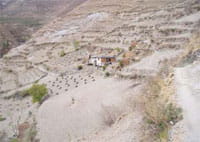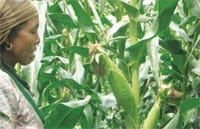A comprehensive programme to address food insecurity in a Dalit village in Nepal

Articles
A comprehensive programme to address food insecurity in a Dalit village in Nepal
2009
A comprehensive programme to address food insecurity in a Dalit village in Nepal

Photo: UMN
The district of Mugu is located in the Himalayan region of Nepal. Only five per cent of the land in the district can be used for agriculture. This is due to steep slopes, poor soil quality, a dry climate and deforestation because of pressure on the forests for fuel, fodder and bedding materials. On average each family is only able to grow enough food to feed itself for four to six months of the year. Some low-caste families grow considerably less than this, particularly the Dalit families (the so-called ‘untouchables’ in the Hindu caste system). Dalit families often live in isolation and form their own communities. They are excluded from social rituals and access to community forest and common land. The majority of Dalits are landless or have a small plot of land. They often work on other farms as bonded labourers.
Setting up the programme
United Mission to Nepal (UMN) has worked with the Dalit community since 1999. In 2004 it set up a team in Mugu to address the root causes of poverty. The team worked with local organisations to carry out an assessment of the social and economic situation in Mugu.
A local organisation, the National Dalit Development Forum (NDDF), was selected for partnership. It was involved in advocacy work which focused on Dalit rights. UMN carried out a series of discussions with NDDF and the Dalit community to decide what action could be taken. They decided to implement a ‘model village’ – a programme that would empower the Dalit community to achieve food security. The Dalit village of Tallighuire, which is home to nineteen households, was selected to participate in the programme. UMN staff helped NDDF and community representatives to design and implement an action plan.
The programme was designed in a comprehensive way. It focused not only on food issues, but also considered the social, economical and educational factors that contribute significantly to the poverty of the Dalit families. Key components of the programme were:
Non-formal education was a key entry point to reaching the Dalit community, particularly women. It was also useful for achieving other components of the programme. The education component initially focused on reading and writing skills and gradually expanded to include practical education and provision of scholarships for Dalit children. In the adult classes, participants learnt about family planning, sanitation, child health, hygiene, immunisation and nutrition as well as household management and environmental issues. Those who participated in the classes gradually started group activities related to savings, village sanitation and campaigns about Dalit issues.
UMN’s role
NDDF took responsibility for overseeing implementation of the programme while UMN provided support to NDDF. This involved building capacity in technical development activities and organisational management. Methods used included mentoring and coaching of NDDF staff, frequent visits to communities and training about accounting, transparency and good governance.
UMN provided NDDF staff with support in planning and implementing the model village programme by:
Results
The programme consisted of a range of activities that directly or indirectly contribute to food security at household level.
The programme was extremely successful in ensuring food security. Households now feel they have more control over food supplies and can manage their food security better.
All of the programme outcomes contribute to reducing poverty in an integrated way. From the perspective of sustainable development, many small efforts contribute to a big change. The success and sustainability of the programme is more about empowerment of the people than the activities themselves or the very immediate results. Many other communities in the district of Mugu have been inspired and are planning to implement a similar programme.
Luma Nath Adhikari is the Lead Advisor on Food Sovereignty for United Mission to Nepal
PO Box 126, Kathmandu, Nepal.
Email: [email protected]
Website: http://www.umn.org.np/
Lessons learnt

Photo: UMN
If you found this resource useful, please share it with others so they can benefit too.

A free digital and print magazine for community development workers. Covering a diverse range of topics, it is published three times a year.
Sign up now - Subscribe to Footsteps magazineYour privacy and peace of mind are important to us. We are committed to keeping your data safe. We only collect data from people for specific purposes and once that purpose has finished, we won’t hold on to the data.
For further information, including a full list of individual cookies, please see our privacy policy.